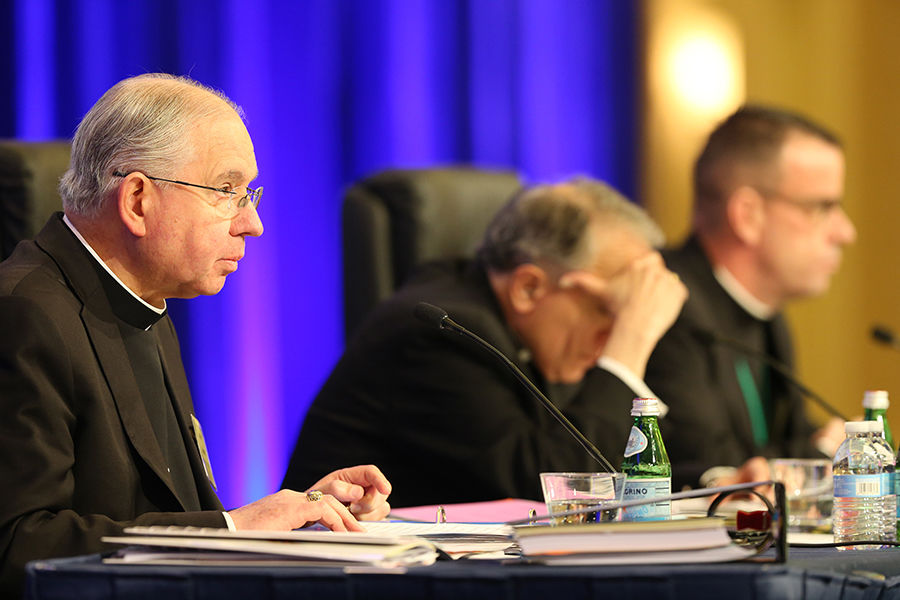As I write this week, I am in Baltimore attending the annual meeting of the United States Conference of Catholic Bishops.
This year we are celebrating the 100th anniversary of the conference. To highlight the importance of the occasion, Pope Francis has sent not only his personal representative, Apostolic Nuncio Archbishop Christophe Pierre, but also Cardinal Pietro Parolin, the Vatican secretary of state.
Most Catholics probably do not think much about the work of the bishops’ conference. But the conference plays a vital role behind the scenes in shaping Catholic life and promoting the common good in our country.
The original body of bishops, known as the National Catholic War Conference, was created in response to the refugee crisis and other sufferings caused by World War I.
Later, as the National Catholic Welfare Conference, the body of bishops helped develop and advance social justice ideas that became a core of the “New Deal” — ideas such as the minimum wage, health insurance and pensions, child labor laws and more.
Today, the bishops’ conference continues to advance the Church’s response to political and cultural issues, while also helping to guide the Church’s work of evangelization and religious education, and promoting vocations and holiness.
At a special centenary Mass here in Baltimore, Cardinal Parolin called attention to the challenges we face in a society that is increasingly secularized and divided.
In his homily, he addressed the body of bishops: “In an age marked by secularization, materialism and a coarsening of human relations, an essential aspect of your task as pastors of the Church in America is to propose hope, in season and out of season, trusting in its power to attract minds and hearts to the truth of Christ.”
The challenge always for the bishops — and for every Catholic, really — is how do we live and proclaim Jesus Christ? How do we witness to our faith in a way that is authentic and complete?
In our times, this challenge becomes more complicated. The key question for the bishops’ conference is this: What is the Church’s role in a society that functions as if there is no God, and in a society that denies that human life has any transcendent purpose or meaning? As our society seems to be growing more hostile to religious ideas, how do we live the Gospel in the world — through our worship and our works of mercy, love and service?
The Church exists to evangelize. We are called to proclaim Jesus Christ and to spread the good news of his teachings. We are called to advance God’s plan of love, his kingdom, in our society.
This is why the bishops are often involved in political and cultural questions regarding human life and human dignity. As bishops, we are spiritual and moral leaders who are also citizens, responsible for doing our part for the good of our country.
And as Catholics, we are called to make our contribution to building a world where life is sacred and where people have what they need to lead a dignified life as children of God.
I have always liked what Servant of God Dorothy Day said: We are called “to build that kind of society where it is easier for people to be good.”
When the bishops speak on policy issues, we speak always as pastors, not as politicians. We want to guide people, to propose principles for helping us to think about issues in light of the Gospel and Catholic teaching.
The bishops seek to challenge people’s consciences and to inspire people to action — to love their neighbor and to perform works of mercy.
We all face the challenge of living our Catholic faith as our primary identity. It is hard sometimes. Our self-interest, our position in the world — sometimes these things can get in the way.
We know that the kingdom of God will never be realized by human efforts or through politics. But we are called to stand in solidarity with those who are hurting, the weakest and most vulnerable members of our society. We are called to struggle against those forces in our culture that deny human dignity and “dehumanize” people.
This is the proud legacy of the U.S. Conference of Catholic Bishops. For these past 100 years, the conference has been an expression of God’s love for the people of this great country.
Pray for me this week and I will pray for you. And let us pray in a special way for the bishops of the United States and for the Church in this country.
Through the intercession of Mary our Blessed Mother, may we be ever more effective servants of the Gospel, that we might lead a new generation to new life in this world and the holiness that will allow us to see God face-to-face in the life of the world to come.
You can follow Archbishop Gomez daily via Facebook, Twitter and Instagram.

